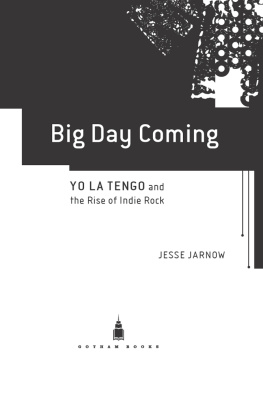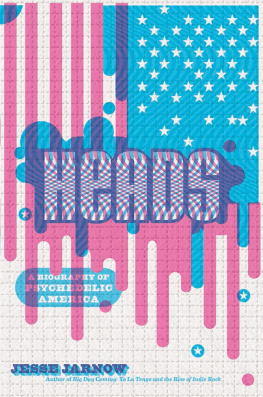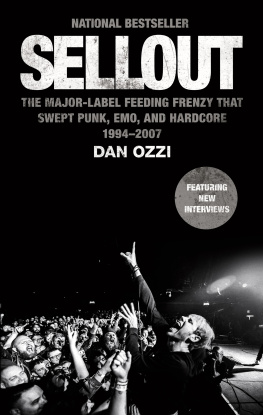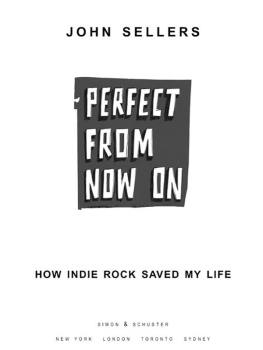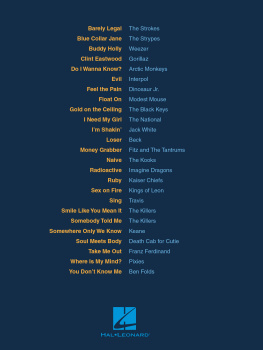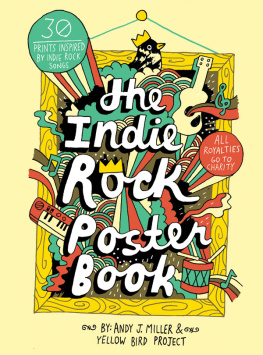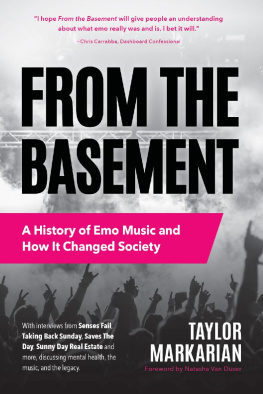Big Day Coming
YO LA TENGO and
the Rise of Indie Rock
JESSE JARNOW

GOTHAM BOOKS
Published by Penguin Group (USA) Inc.
375 Hudson Street, New York, New York 10014, U.S.A.
Penguin Group (Canada), 90 Eglinton Avenue East, Suite 700, Toronto, Ontario M4P 2Y3, Canada (a division of Pearson Penguin Canada Inc.); Penguin Books Ltd, 80 Strand, London WC2R 0RL, England; Penguin Ireland, 25 St Stephens Green, Dublin 2, Ireland (a division of Penguin Books Ltd); Penguin Group (Australia), 250 Camberwell Road, Camberwell, Victoria 3124, Australia (a division of Pearson Australia Group Pty Ltd); Penguin Books India Pvt Ltd, 11 Community Centre, Panchsheel Park, New Delhi 110 017, India; Penguin Group (NZ), 67 Apollo Drive, Rosedale, Auckland 0632, New Zealand (a division of Pearson New Zealand Ltd); Penguin Books (South Africa) (Pty) Ltd, 24 Sturdee Avenue, Rosebank, Johannesburg 2196, South Africa
Penguin Books Ltd, Registered Offices: 80 Strand, London WC2R 0RL, England
Published by Gotham Books, a member of Penguin Group (USA) Inc.
First printing, June 2012
10 9 8 7 6 5 4 3 2 1
Copyright 2012 by Jesse Jarnow
All rights reserved. No part of this book may be reproduced, scanned, or distributed in any printed or electronic form without permission. Please do not participate in or encourage piracy of copyrighted materials in violation of the authors rights. Purchase only authorized editions.
Gotham Books and the skyscraper logo are trademarks of Penguin Group (USA) Inc.
LIBRARY OF CONGRESS CATALOGING-IN-PUBLICATION DATA
Jarnow, Jesse.
Big day coming : Yo La Tengo and the rise of indie rock / Jesse Jarnow.
p. cm.
ISBN: 978-1-101-58868-0
1. Yo La Tengo (Musical group) I. Title.
ML421.Y6J37 2012
782.421660922dc23
2011053088
Printed in the United States of America
Set in Egyptienne LT Std and Conduit ITC
Designed by Nora Rosansky
While the author has made every effort to provide accurate telephone numbers and Internet addresses at the time of publication, neither the publisher nor the author assumes any responsibility for errors, or for changes that occur after publication. Further, the publisher does not have any control over and does not assume any responsibility for author or third-party websites or their content.
ALWAYS LEARNING
PEARSON
For Caitlin
Introduction
The Story of Yo La Tango
The first typo came with the second or third print appearance: Wo La Tengo. It was in an ad by Maxwells, even, the Hoboken club where the bands two primary members worked and veritably lived. The band had debuted there two months earlier, in December 1984, doing two sets at a party in the back room, and misspelled names were the least of their worries.
They opened with an instrumentalSurfin with the Shah by UCLA band the Urinalsand that had gone well enough. The guitarist was a baby-faced twentysomething with an erupting halo of hair. When it came time for the nights first vocals, no words came from his mouth.
Not exac. clear if anyone in the band had any sort of grip on their instruments, one contemporary writer noted of their early gigs. Despite the fact that they were a trio, the guitarist took no solos. That night and for many to follow, the drummera shy girl with round cheeks and a room-lighting smiledidnt sing at all.
The misspelled name would trail Ira Kaplan and Georgia Hubley in almost daily fashion through their career, an irony that was not lost on two people who regularly worked as freelance copy editors. They kept a running tally.
There was a show as the classic Yo La Tango in 1995. Atlantas Masquerade was always just like a home away from home to us, if the people in your family always spelled your name wrong and built the stage right above the pumping techno soundsystem, they later noted. The Florida Theater in Jacksonville offered a French twist, as Yo Le Tengo. In Australia, a promoter managed to achieve the trifecta, getting vowels wrong in each word: Ya Lo Tango. Set to make their network television debut nine years after their first gig, Conan OBrien squinted at a cue card and cheerily announced the next nights musical guest: Yo Lo Tengo!
They didnt always have such a troubling name. At first, they called themselves A Worrying Thing. Like the name they settled onYo La Tengothey found it in a book about baseball.
Doesnt matter what you did yesterday, Cleveland Indians pitcher Stanley Coveleski told writer Lawrence Ritter. Thats history. Its tomorrow that counts. So you worry all the time. It never ends. Lord, baseball is a worrying thing. When their own worries had them looking for a new name, Kaplan and Hubley passed on another similarly diminutive baseball term, the Bad Hops, looking for a phrase that was meaningless enough for potential audiences to project onto. Yo La Tengo won.
Its source was a story about the New York Mets, a Kaplan obsession since his Hudson Valley youth. Born only five years before the Mets came into existence in the National Leagues 1962 expansion, the young Ira fell in love with the bumbling squad early in their arc upward from the worst season in modern baseball history, during which they lost 120 out of 160 games.
One reason for their losses was that center fielder Richie Whitey Ashburn often collided on fly balls with Venezuelan-born shortstop Elio Chacn, one of the first Latin American players in the Major Leagues. He didnt understand Ashburns call of Ive got it. A Spanish-speaking teammate instructed Ashburn to try barking yo la tengo! the next time a fly ball came their way.
Ashburn did so. Chacn stopped, but crew-cut left fielder Frank Thomas barreled straight into Ashburn.
Whats a yellow tango? he asked.
Kaplan and Hubley were tentative about playing music in front of people, and the image of a misplayed fly ball was one of innocent terror. Like the misspellings, it followed them, an ancient blooper reel stuck in loop. And when the name was spelled correctly, some were still left wondering if the band played Latin music. For years, famed New York radio host Vin Scelsa insisted on pronouncing it with a heavy Spanish accent.
The name remained eminently unspellable, even as they got better and bigger. In 1993 their label, Matador, sold 49 percent of itself to Atlantic Records, stepping up the distribution of their wares (including Yo La Tengos latest) from a hard-built network of subcultural outposts to the full American marketplace. As part of its flirtation with the mainstream, the label released the soundtrack to Amateur, indie director Hal Hartleys own dalliance with Sony, featuring all-star Matador recording artist Yo La Tango.
In 2006, more than twenty years into their career, the band appropriated the typo for a song title, The Story of Yo La Tango, the twelve-minute final track on its new album, I Am Not Afraid of You and I Will Beat Your Ass. The discs title, taken from another piece of pro-sports doggerel, was a sign of a confidence it was hard to imagine almost a quarter century earlier.

